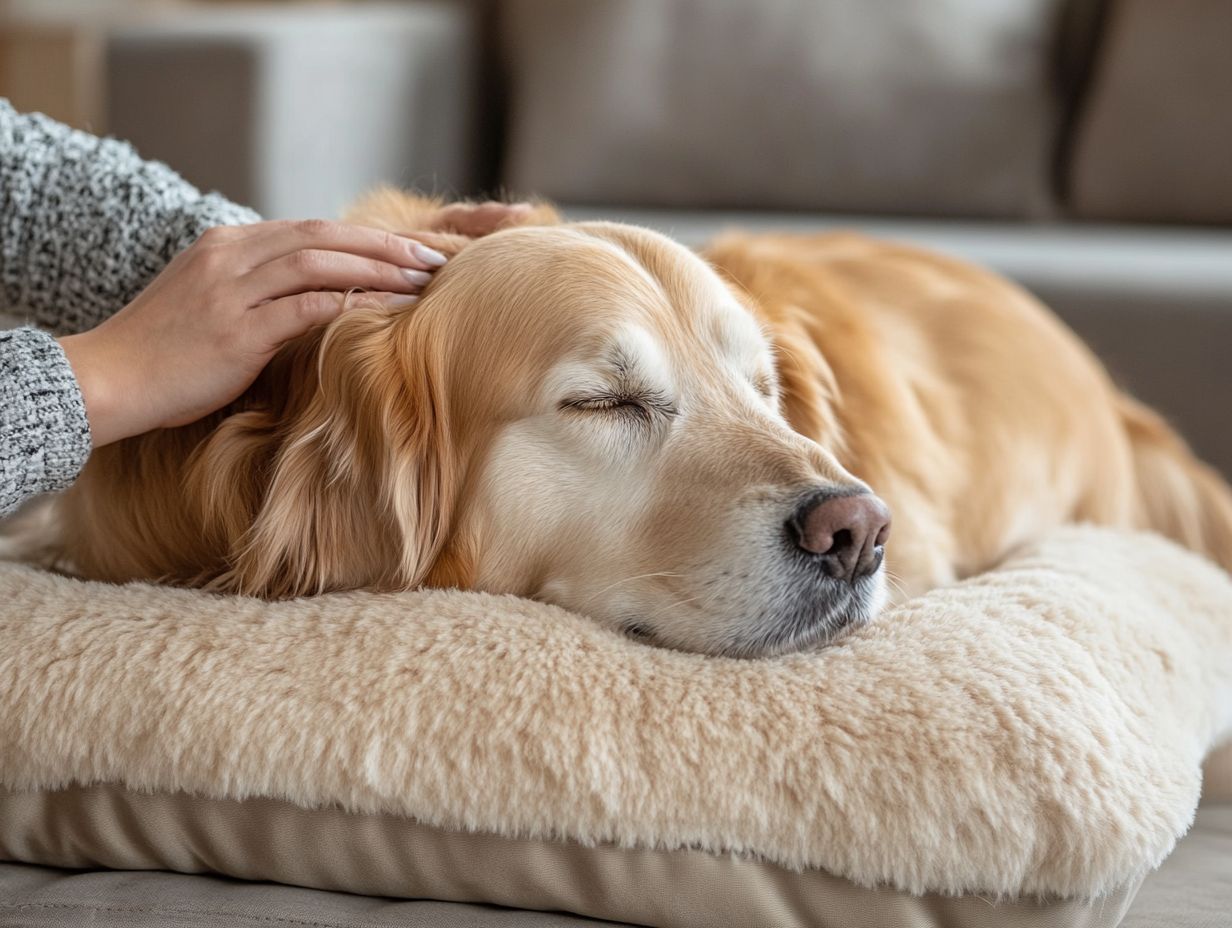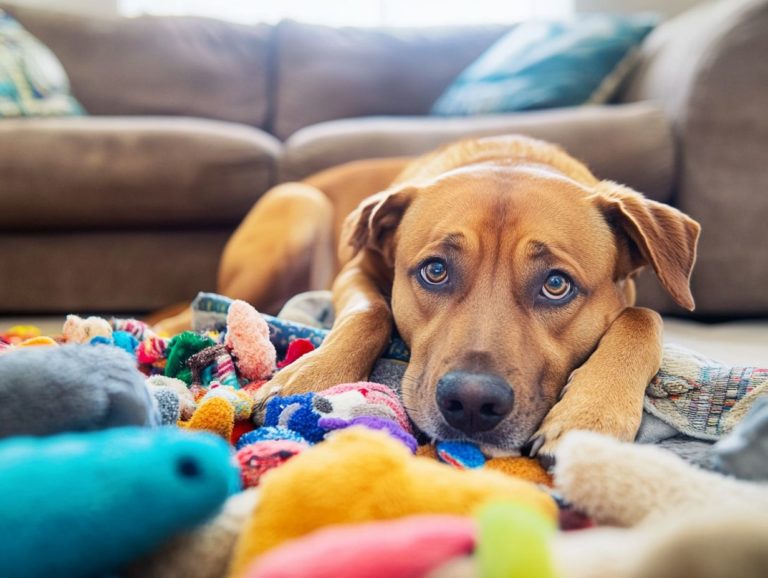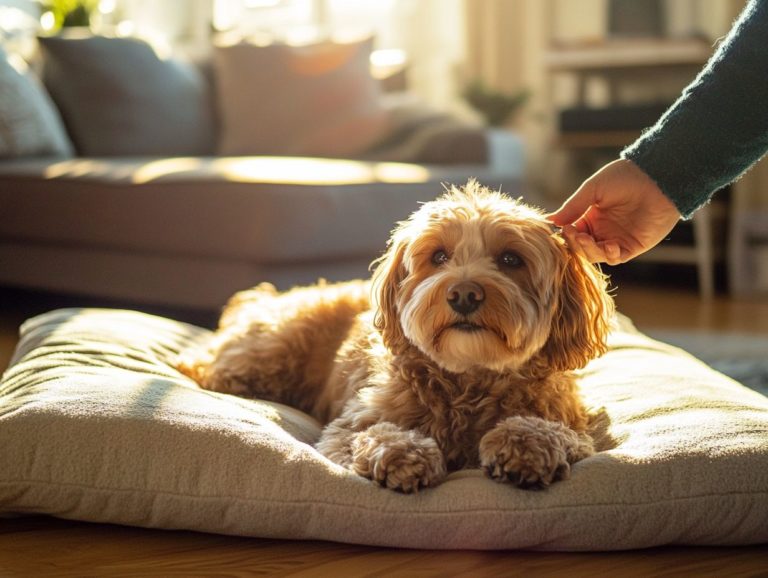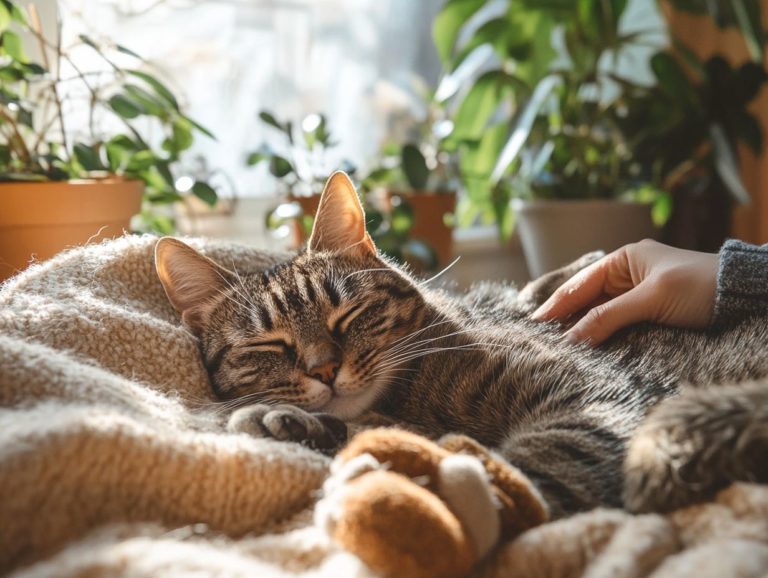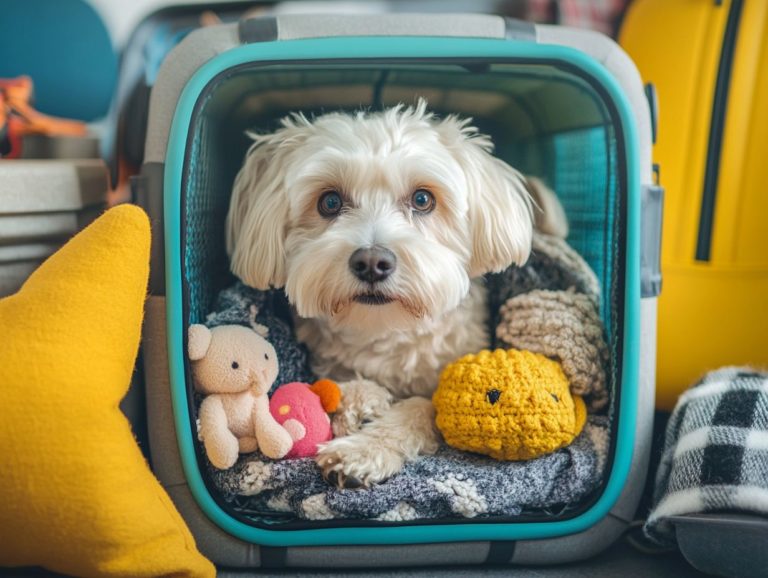Can Pet Anxiety Be Treated Effectively?
Understanding pet anxiety is crucial for you as a pet owner who wants to ensure your furry companions are both happy and healthy. Various anxiety disorders can affect them, and recognizing these symptoms is your first step toward providing the help they need.
Just like us, pets can encounter anxiety triggered by factors such as separation and noise phobias. Let s explore the common causes of pet anxiety and discover effective solutions together!
This article discusses the causes of pet anxiety and effective treatment options from medications and behavior modification techniques to natural remedies.
You ll find tips for creating a calming home environment for your dog, along with guidance on knowing when it s time to seek professional assistance from a specialist who helps pets with behavior issues.
Join us in discovering practical solutions to ease your pet’s anxiety and enhance their quality of life, including effective anxiety treatment plans.
Contents
Key Takeaways:
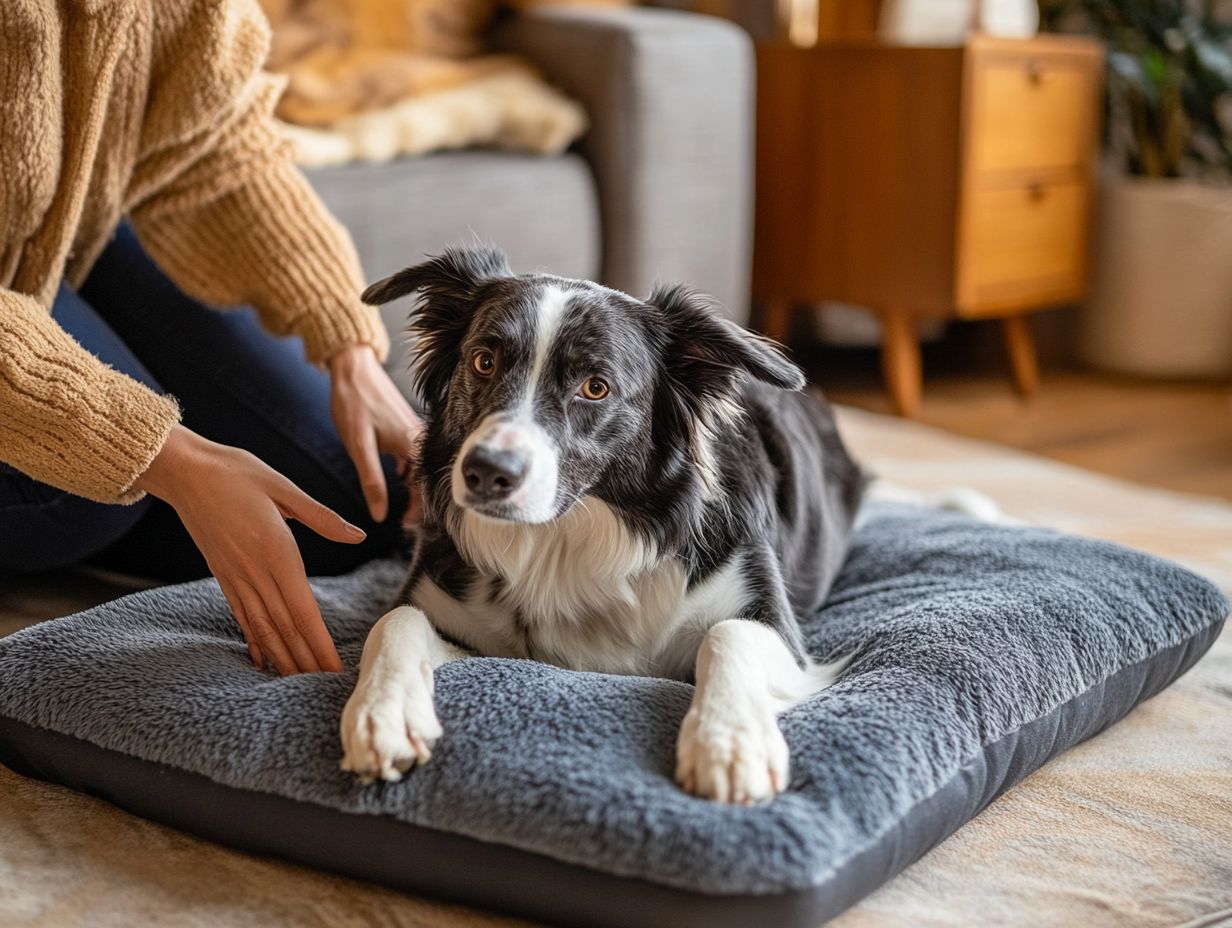
- Pet anxiety can be effectively treated through a combination of medication, behavioral therapy, and natural remedies.
- Creating a calming environment and incorporating training exercises can help manage pet anxiety at home.
- Signs of severe anxiety in pets should not be ignored seeking professional help from a veterinarian is crucial for their well-being.
Understanding Pet Anxiety
Understanding pet anxiety is essential for dog owners who wish to enhance the mental health of their cherished companions. Anxiety can present itself in multiple ways, such as separation anxiety, situational anxiety, and noise phobias common behavioral disorders that affect dogs and greatly impact their overall well-being.
The first step in addressing this issue is identifying the specific triggers of anxiety. By recognizing the symptoms, you can pursue appropriate veterinary care and collaborate with a specialist who helps pets with behavior issues to create a tailored plan that caters to your dog’s unique needs. This ultimately fosters their emotional well-being.
Causes and Symptoms
The causes and symptoms of dog anxiety can differ greatly from one dog to another, often shaped by their unique environment and past experiences. Common triggers include separation from you, unfamiliar situations, and loud noises. These can lead to distressing behaviors, such as barking, panting, or even destructive actions.
Certain breeds might be genetically predisposed to anxiety, making them more sensitive to stress compared to others. Environmental factors such as changes in your home, moving to a new location, or even the presence of aggressive pets can intensify these anxious tendencies, possibly leading to more severe anxiety disorders.
Symptoms can manifest in various ways. For instance, some dogs may cling to you or exhibit hypervigilance, while others might choose to hide or engage in excessive licking. By recognizing these signs early on, you can take proactive steps to seek appropriate interventions or consider medications for dogs, ensuring that your furry companion receives the understanding and care they truly deserve.
Effective Treatment Options for Pet Anxiety
When addressing canine anxiety, a range of effective options awaits you, including various anxiety medications and behavior modification techniques. Additionally, you might wonder if professional training can help with pet anxiety, which can also enhance your dog’s quality of life.
Short-term medications, like fluoxetine and alprazolam, can offer immediate relief. Long-term strategies can be crafted specifically for your dog’s needs in collaboration with veterinarians and behavior consultants.
Don’t wait! Take action now to help your pet feel secure and happy!
Medication and Behavioral Therapy
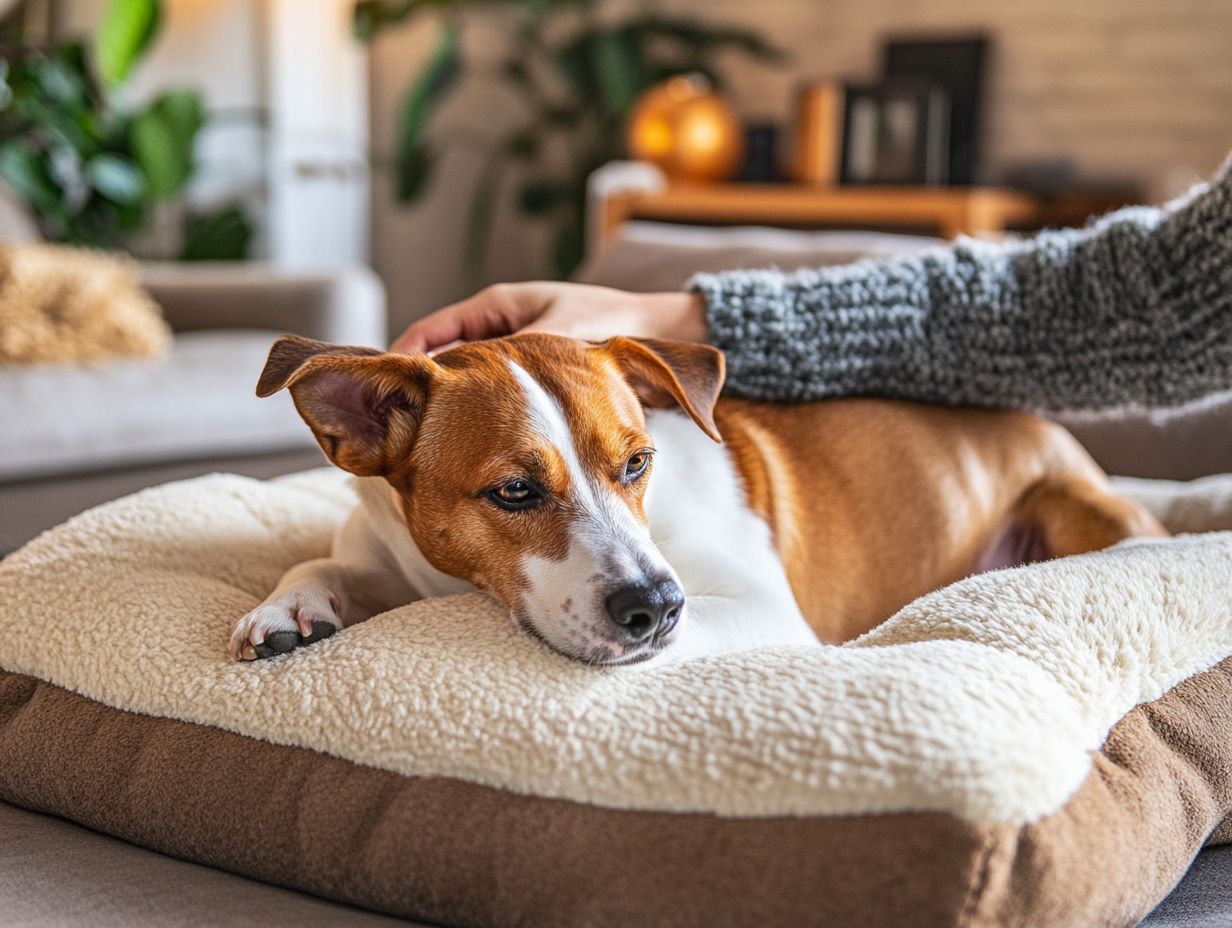
Medication and behavioral therapy are two key approaches to treating dog anxiety, and understanding whether pet anxiety is becoming more common can help in choosing the right treatment. Using them together often yields the best results.
Anxiety medications like fluoxetine, amitriptyline, and alprazolam can provide quick relief during stressful moments. Long-term options help stabilize serotonin levels and improve your dog’s overall mental health.
Each medication works differently. Some act quickly to calm your dog in stressful situations, while others require time to build up in the system for lasting effects.
Be aware of potential side effects of anti-anxiety medications, which can vary from mild lethargy to more serious reactions. Regular communication with your veterinary professional is essential.
Combining medication with behavioral therapy techniques such as desensitization and changing your dog’s response to stress can enhance the effectiveness of your treatment plan.
Regular check-ins with your vet allow for adjustments in dosage or therapy methods, ensuring you’re effectively addressing your dog’s unique needs.
Natural Remedies for Pet Anxiety
Natural remedies for pet anxiety provide alternative options to help manage your dog’s stress and anxiety levels.
These remedies include calming techniques, alternative therapies like Rescue Remedy, and physical interventions such as calming coats designed to alleviate anxiety in dogs.
Each approach is crafted to create a soothing environment for anxious dogs. This ensures they feel more secure and relaxed in their surroundings, which is crucial for effective anxiety management.
Alternative Approaches and Supplements
Alternative approaches and supplements are increasingly popular among dog owners seeking non-pharmaceutical methods to manage canine anxiety.
You might explore soothing techniques like massage and aromatherapy, as well as targeted supplements designed to promote relaxation and enhance overall well-being.
Options such as melatonin and valerian root may be particularly effective. Many pet owners are drawn to these alternatives for their effectiveness and holistic nature in addressing anxiety, but it’s also important to explore best practices for pet anxiety training.
As you explore various therapies, consider your dog’s unique needs. What brings calm to one dog may differ for another.
Research shows that supplements with ingredients such as valerian root, chamomile, or CBD can significantly reduce anxiety levels. These options can be game-changers for your dog’s well-being!
Incorporating gentle grooming sessions offers a therapeutic touch. This can create a bonding experience that soothes both you and your pet.
To truly harness the benefits of these therapies, adopt a combined approach. Integrate behavioral modifications with natural supplements tailored to your dog s specific anxiety triggers.
Managing Anxiety at Home
Managing anxiety at home is crucial for your dog’s comfort and well-being. It involves crafting a calming environment paired with effective training exercises, including exercise to help alleviate anxiety.
Employ specific anxiety management techniques by understanding common anxiety triggers. This can help diminish anxiety triggers, making your pet feel secure and at ease in their surroundings.
Don’t wait to help your furry friend! Consult with a veterinary professional today to find the best treatment plan for your dog’s anxiety.
Creating a Calming Environment
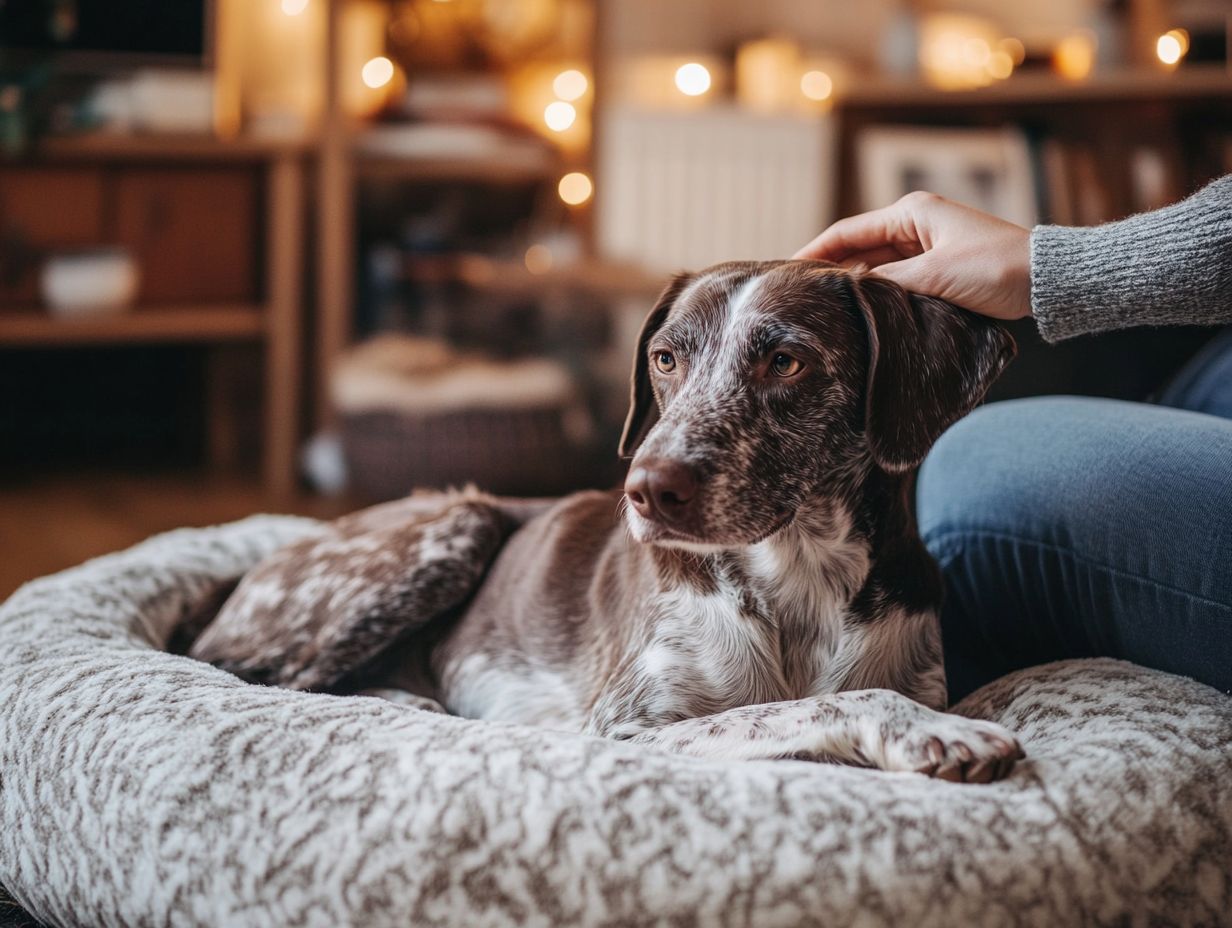
Creating a calming environment is essential for you as a dog owner aiming to alleviate anxiety in your pet. By minimizing stress triggers and fostering a sense of security, you can make a significant difference in their well-being. Use calming scents and keep the atmosphere quiet to help your furry friend.
Consider offering physical contact simple yet effective strategies that contribute to stress relief for anxious dogs. To further enhance tranquility, think about soundproofing areas of your home.
Heavy curtains or sound-dampening panels can absorb disruptive noises that may cause distress, especially for dogs with noise phobias.
Incorporating calming aids like ThunderShirts can also be beneficial, especially for dogs experiencing anxiety during stressful situations, like thunderstorms or fireworks.
Creating a daily routine can work wonders for your dog’s anxiety! Regular playtime, meal times, and even designated quiet moments can all significantly contribute to fostering a serene atmosphere for your furry friend, which is vital for managing anxiety.
Training Exercises for Anxiety Reduction
Incorporating training exercises into your dog’s daily routine can significantly reduce anxiety and modify behavior. By using positive reinforcement and maintaining consistency, you can teach your pet effective coping mechanisms to navigate their anxiety triggers.
One powerful strategy is desensitization, which means getting your dog used to scary things slowly. Gradually exposing your dog to anxiety-inducing situations like loud noises or unfamiliar people allows them to learn how to remain calm.
Obedience training is another vital component. It reinforces structure and discipline, providing your dog with a sense of security. Using commands like sit and stay enhances behavior and deepens the trust between you and your pet.
Patience is crucial in this process. Successful trainers emphasize that consistent reinforcement and gentle corrections over time lead to significant improvements in managing dog anxiety.
For example, using treats during exposure can transform challenging environments into more manageable and less intimidating experiences for anxious dogs.
When to Seek Professional Help
Understanding when to seek professional assistance is crucial for dog owners facing severe anxiety in their pets. This is particularly important when anxiety symptoms begin to escalate or disrupt daily routines.
Consulting a qualified dog trainer or a behaviorist can provide valuable insights into effectively managing pet anxiety. For pet owners wondering if medication is necessary for pet anxiety, it’s important to recognize indicators of severe anxiety, which may manifest as ongoing distress, destructive behaviors, or intense reactions to specific triggers.
Recognizing these signs ensures that you can provide the best support for your furry companion.
Signs of Severe Anxiety and Seeking Veterinary Care
Recognizing the signs of severe anxiety in your dog is crucial for ensuring timely veterinary care and intervention. Symptoms like excessive barking, chewing, or desperate attempts to escape can signal that your dog is grappling with significant anxiety that may require professional treatment.
Behaviors like pacing, panting, and loss of appetite also indicate distress. These indicators affect your dog’s emotional well-being and can lead to physical health issues if left unaddressed.
As a devoted caretaker, understanding these manifestations is essential untreated anxiety can escalate into more severe conditions.
Therefore, seeking guidance from veterinary care providers and certified behaviorists is vital for conducting thorough assessments. They can develop tailored treatment plans that effectively address your dog s emotional and physical health.
Act quickly to help your cherished pet enjoy a happier, more balanced life!
Frequently Asked Questions
Wondering if your pet is anxious? Here are some common concerns pet owners have:
Can Pet Anxiety Be Treated Effectively?
Yes, pet anxiety can be treated with the right approach and tools. Consider exploring effective strategies for pet anxiety and seek professional help for the best results.
What are the signs of pet anxiety?
Signs include excessive barking, destructive behavior, trembling, and restlessness. Pay close attention to any changes in your pet’s behavior.
How can I help my pet with anxiety?
You can help your pet through behavioral training, calming treats, and vet-prescribed medication. Each pet is different, so find what works best!
Do natural remedies work for pet anxiety?
Natural remedies, like essential oils and calming treats, can ease anxiety in pets. For more information, check out what natural remedies can help with pet anxiety. Always consult with your vet before trying new options.
What role does exercise play in treating pet anxiety?
Regular exercise reduces stress and boosts your pet’s well-being. It also strengthens the bond you share!
Is it possible for pet anxiety to be completely cured?
Pet anxiety might not be completely cured, but with the right management, it can be significantly improved. To understand how long it takes to treat pet anxiety, don’t wait! Help your anxious pet today!

